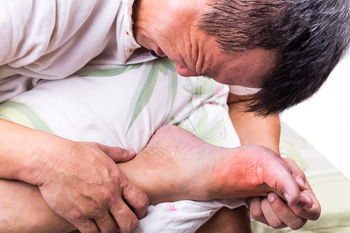
(908) 381-8160Berkeley Heights

Do you have pain in your big toe? Is your big toe swollen? Did these symptoms occur after being sick or becoming injured? If you answered yes to any of these questions, you may be afflicted with a condition known as gout. Gout is an inflammatory type of arthritis caused by a buildup of uric acid in the blood. Uric acid is naturally produced in the body to help you break down foods that contain purines. Once the purines are broken down, they are cleansed from the body through urine. If something interferes with this process, the buildup of uric acid can turn into urate crystals that collect around soft tissues and joints like the big toe. This can result in inflammation or gout. Men are said to be more susceptible to gout, as are those who eat foods rich in purines. Genetics, health problems like diabetes or high cholesterol, being obese, those who drink alcohol, and those who take diuretics may have an increased risk of developing gout. The pain from gout can be so severe it can interfere with walking and other daily activities. If you think you have gout, make an appointment to see a podiatrist for an accurate diagnosis and a treatment plan.
Gout is a painful condition that can be treated. If you are seeking treatment, contact Dr. Janet Leicht from New Jersey. Our doctor will treat your foot and ankle needs.
What Is Gout?
Gout is a form of arthritis that is characterized by sudden, severe attacks of pain, redness, and tenderness in the joints. The condition usually affects the joint at the base of the big toe. A gout attack can occur at any random time, such as the middle of the night while you are asleep.
Symptoms
Risk Factors
Prior to visiting your podiatrist to receive treatment for gout, there are a few things you should do beforehand. If you have gout you should write down your symptoms--including when they started and how often you experience them, important medical information you may have, and any questions you may have. Writing down these three things will help your podiatrist in assessing your specific situation so that he or she may provide the best route of treatment for you.
If you have any questions, please feel free to contact our office located in Berkeley Heights, NJ . We offer the newest diagnostic and treatment technologies for all your foot care needs.